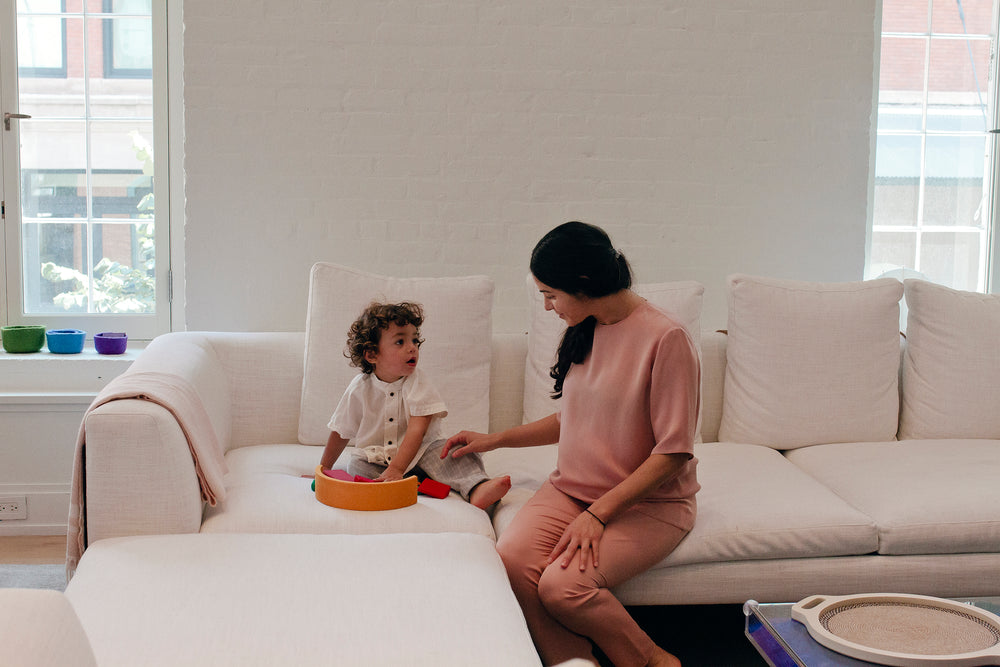When Multitasking Takes Over: 5 Tips to Help Families Reconnect While Getting Things Done


Multitasking is a must when it comes to pandemic parenting. For better or worse, most parents I know have become master multitaskers since this all began. Personally, I struggle with patience and presence when multitasking beside my children. There are days when I hear myself repeatedly promising, “I’ll be there in a minute!” I take this as a sign that I’m feeling overwhelmed by my neverending to-do list and rely on the strategies below to reconnect with my children and prioritize their needs. If you also have a love/hate relationship with multitasking, give these tips a try!
★ Use specific events or tasks to express exactly when you’ll be available.
The concept of time is abstract and waiting is hard. This is especially true if/when children are told we’ll join them in “one minute” and they feel like they’ve been waiting a LONG time. Try saying, “It seems like you really want to paint with me. I’m going to work on my computer until lunchtime. We can paint together right after lunch.”
★ Follow through on the specific timeframes you’ve offered.
It’s tempting to continue checking things off the to-do list if your child has settled into independent play or is (finally) peacefully playing with a sibling. However, if you’ve told your child that you’ll come play after washing 3 dishes, be sure to check in once those dishes are washed!
★ Rely on simple setups for transitions throughout the day.
Many children crave physical and emotional attention the moment they return home from school, playdates, or outings. Spend a couple minutes helping your child with the physical stuff (removing shoes, washing hands) and then point out what you’ve set up. “I’m going to make lunch now. Check out what I’ve set up on the small table!” Keep it simple: paper with a jar of crayons, playdough with twigs or seashells, or a stack of new books from the library.
★ Consider how much time your child spends playing on his or her own.
Are your expectations appropriate for your child’s age and developmental stage? How long do you expect your child to play independently while you are getting things done? Are there shifts you can make in your daily routine to include your child in chores or meal prep? Instead of preparing dinner while your child is playing nearby, invite your child to take on the role of sous chef!
★ Prioritize shared play experiences.
Add PLAY to your calendar or to-do list and make it a top priority. A consistent, dedicated playtime might be helpful for you and your child. For example, maybe the time between dinner and your child’s bedtime becomes “family playtime”. You can avoid scheduling anything else at that time and your child will look forward to these shared experiences. Limit distractions by keeping screens off and tucking phones out of sight. Sit on the floor with your child and engage in whatever type of play they’re craving. Even mini play sessions of 10-15 minutes can serve as a powerful way to reconnect in the midst of a hectic day.
For more language support, check out our Guide to Positive Language Strategies and our Positive Language Webinar Series. In our webinar, Enhancing Family Connection Through Play, we discuss playful ways to approach the everyday activities we share with our children. We also offer practical tips to help you structure meaningful play experiences for the whole family.
Recent Articles
-
Playful Primer 10 Must-Have Toys for Your Next Backyard BBQ
Summer is just around the corner and we're ready for it! From backyard BBQs to neighborhood park outings, we've discovered...
read more -
Playful Primer Tips & Toys to Support Group Play Experiences
Catching a glimpse of children happily engaged in pretend play is like witnessing pure magic. Ever wonder how closely you...
read more -
Playful Primer 5 Ways to Strengthen the Bond Between Siblings
“I’ll take care of the bike. You take care of each other.” This is what I said to my children...
read more
